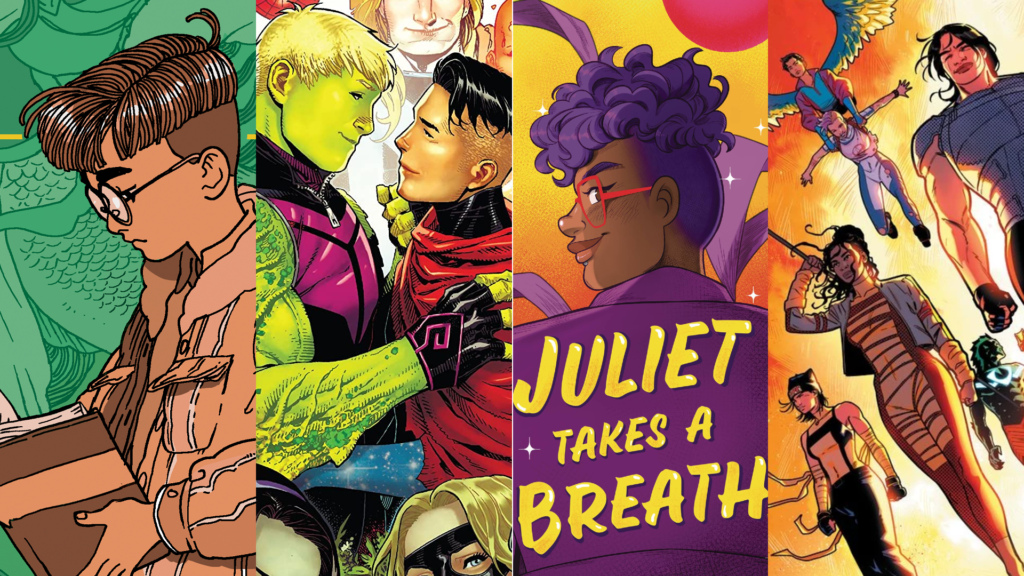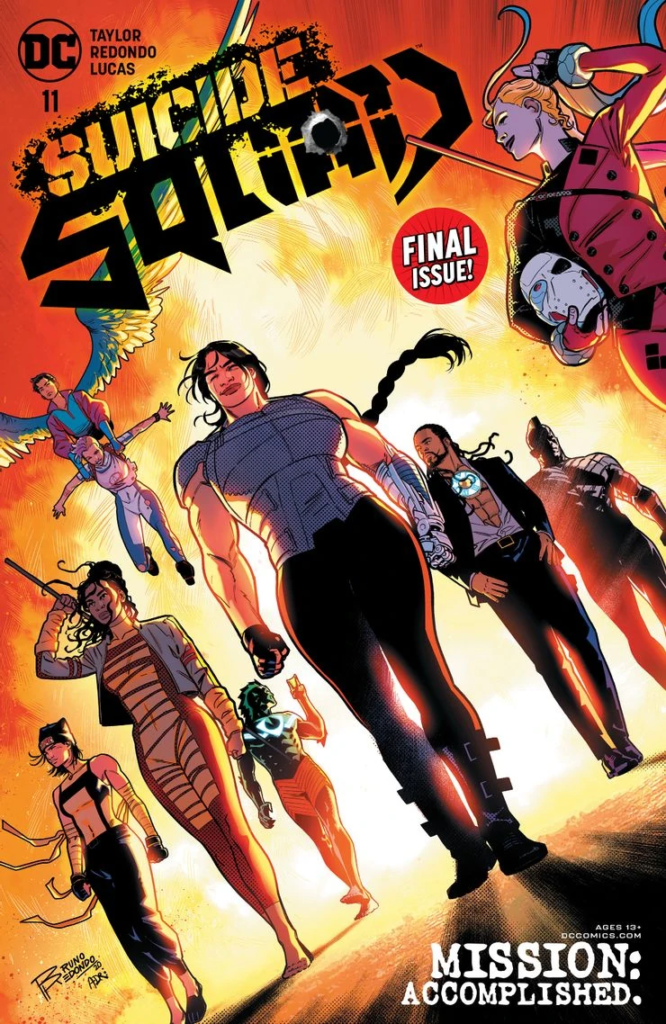
Comics Corner – All the LGBTQ+ Comics contending for the GLAAD Media Awards 2021
The nominees for the 32nd GLAAD Media Awards have been announced, and the comic book slate shows the growing diversity and inclusion of the medium.
For those unaware, GLAAD is an American monitoring organisation, founded in 1985 as the Gay and Lesbian Alliance Against Defamation – although now known solely by the acronym, so as not to exclude bi, trans, and other queer people – to combat homophobia in reporting and to lobby for better representation in media. Since 1989, the GLAAD Media Awards have celebrated excellence in LGBTQ+ broadcasting and publishing, initially focussing entirely on TV but in recent years encompassing more varied creative outlets.
The Awards first introduced a comics category in 1992, recognising William Messner-Loeb’s work on The Flash and the revelation that Pied Piper, a reformed villain turned Flash ally, was gay. However, this was a one-off seemingly to highlight the importance of introducing a gay character in a mainstream superhero comic. It wasn’t until 1996 that GLAAD would have an annual comics category.
This year’s list of nominees features an impressive mix of mainstream superhero comics, independent titles, and young adult graphic novels – several of which we’ve already highlighted here on Comics Corner.
One of the more interesting nominees is Marvel’s Empyre event. As a big summer crossover that ultimately encompassed three dozen comics – and that was cut down from more than 50 planned issues, after production delays due to the COVID pandemic resulted in cancellations and publication changes – it’s unusal to see it get much awards attention. However, as Empyre focussed on the relationship between Hulkling and Wiccan, and even saw them getting married twice, it’s easy to understand why it gets the nod.

Even so, GLAAD’s nomination is slightly muddled, seemingly grouping together the main Empyre miniseries (written by Al Ewing and Dan Slott, with art by Valerio Schiti and Marte Gracia, and lettering by Joe Caramagna), the Lords of Empyre: Emperor Hulkling one-shot (written by Chip Zdarsky and Anthony Oliveira, art by Manuel Garcia, Cam Smith, and Triona Tree Farrell, and lettering by Travis Lanham), and Empyre Aftermath: Avengers (written by Ewing, art by Schiti and Gracia, lettering by Ariana Maher). It’s the first time in the history of the GLAAD Media Awards that a crossover has been nominated though, and it will be interesting to see how such a splintered entry fares.
Other Marvel comics up for the award are the current volume of Guardians of the Galaxy – another Al Ewing penned comic, with art chiefly by Juann Cabal and Marcio Takara – and X-Factor, written by Leah Williams, with art by David Baldeon, Carlos Gomez, and Israel Silva, and lettering by Joe Caramagna.
Guardians is somewhat of a double threat, with Ewing establishing team members Marvel Boy and Hercules as dating, featuring married lesbian couple Phylla-Vell and Moondragon, and recently revealing team leader Star-Lord as bisexual. It’s easily one of Marvel’s best titles for LGBTQ+ representation, and it seems set to continue to be so with the recent announcement that Hulkling and Wiccan will be joining the team with the April 2021 release of #13.
X-Factor, meanwhile, immediately provided some of comics’ best LGBTQ+ representation when it launched in July 2020. A satellite team for the X-Men, X-Factor is lead by Northstar, Marvel’s first openly gay superhero, and features two bisexual men on the team – ‘disaster bisexual’ Daken, the son of Wolverine, and ‘distinguished bisexual’ Prodigy. Bisexual male representation remains extremely poor across all media, so a title having two bi men on the team, allowing the storytelling potential to explore distinct personality types and approaches to their sexuality is refreshing. X-Factor also features Rachel Summers, AKA Prestige, who has long been queer-coded, though never officially stated to be bi or pansexual – yet.
Marvel’s Distinguished Competition, DC, fares slightly better, picking up four nominations. Chiefmost amongst those is the brilliant Far Sector, a new Green Lantern title telling an original story that has been, so far, removed from the complex continuitty at the centre of the DC Universe. Written by N.K. Jemisin, with art by Jamal Campbell and lettering by Deron Bennett, the series focuses on rookie Green Lantern Sojourner ‘Jo’ Mullein, sent to oversee a vast alien society that’s just experienced its first murder in centuries.
The series is a blend of hard science fiction and pulp noir detective mysteries, and has fast become one of DC’s best titles on the stands. Jo herself is a real highlight though, that rare case of a brand new character who really connects with readers. With experience in the US military and as a police officer, she’s a seasoned professional perfectly suited to her new role, but she’s also the first Black woman to wear a Green Lantern ring, and all too aware of systemic injustices. She’s also quietly queer, shown to have had relationships with women and men alike, but never with any labels attached. That makes for a fascinating perspective – especially since Green Lanterns are effectively space cops, and Far Sector takes place against a real-life backdrop of the Black Lives Matter movement – and could aid the comic’s chances at awards success, being both LGBTQ+ friendly and socially relevant.
DC’s other nods include the recently concluded Lois Lane 12-issue maxiseries, Suicide Squad, and the YA graphic novel You Brought Me the Ocean.

Lois Lane, written by Greg Rucka and with art by Mike Perkins, Gabe Eltaeb, and Andy Troy, and lettering by Simon Bowland. Spinning out of recent events in the core Superman titles, the series focussed on Lane as an ace journalist, investigating the secretive Leviathan organisation. It also re-established Renee Montoya, one of DC’s most prominent lesbian heroes, as The Question.
Suicide Squad may seem like an odd choice for recognition – after all, the team of super-villains forced to take on dangerous missions for the US government is better known for killing off its characters than exploring their romantic lives, gay or straight. However, in the recent volume of the series (written by Tom Taylor, art by Bruno Redondo and Adriano Lucas, lettering by Wes Abbott), readers met three new queer characters – superhumanly strong cyborg Osita, teleporter Wink, and winged flier The Aerie. The latter is also confirmed to be non-binary. Given the murky moral area that the Suicide Squad operates in, the series stands out for allowing an exploration of flawed and complex queer characters.
You Brought Me the Ocean, meanwhile, is a standalone title inspired by the core DC Universe, but telling a unique story divorced from continuity. Written by Alex Sanchez, with art by Julie Maroh and lettering by Deron Bennett, the graphic novel is based on the modern Aqualad, Jackson Hyde, who was established as gay when he first appeared in 2010. Here slightly reimagined as Jake Hyde, the book explores his relationship with swim team captain Kenny Liu while he struggles to comprehend strange abilities he seems to be developing. Aimed at a teen audience rather than typical superhero readers, this swaps capes and costumes for personal drama and the emotionally fraught act of coming out, making super powers and sexuality a complementing metaphor.
Elsewhere, Boom! Studios picked up two nominations, one for James Tynion IV, Michael Dialynas, and Aditya Bidikar’s Wynd, and one for Juliet Takes a Breath, by Gabby Rivera, Celia Moscote, James Fenner, and DC Hopkins.
Wynd is a fantasy series set in a world where possessing magic is punishable by death – forcing the eponymous protagonist to keep his identity as a ‘weirdblood’ a secret. It’s a task that would be easier if he didn’t have distinctively pointy ears, and he weren’t at the centre of a strange conspiracy. Thankfully, Wynd is aided by “the boy of his dreams” as he tries to survive. It’s a beautifully illustrated weird fable, with a unique vision of what a fantasy world can look like, and a pleasingly diverse cast. Tynion also penned The Backstagers for Boom!, and Wynd is a fine addition to the growing library of queer comics for a younger LGBTQ+ audience.
Juliet Takes a Breath adapts Rivera’s original prose novel into comic form, following Juliet Milagros Palante as she navigates life as a newly-out lesbian. Attempting to balance self-discovery with a disapproving Puerto Rican family, plus a new job interning for her favourite feminist author, is tough though – especially when her hero turns out not to have the answers she was hoping for. Moscote and Fenner’s art bring the tale to life for a comics audience, helping give it a different weight and perspective in the process.

Finally, Trung Le Nguyen’s The Magic Fish, published by Random House Graphic, may end up being the underdog that sweeps the prize. The self-contained graphic novel is a coming-of-age story focussing on Tiến, a young Vietnamese-American boy struggling to bridge a cultural and linguistic divide, and explain to his parents that he’s gay.
Nguyen’s beautifully illustrated pages and poignant story are elevated further by the use of fairy tales and fables, as Tiến frames his own journey through the stories he reads in his beloved books. It’s a brilliant approach, giving the work an air of fantasy while still remaining rooted in the real world.
Overall, a packed slate of contenders for this year’s GLAAD Media Awards, but a refreshingly diverse one, both in terms of material and focus. The superhero titles may have more mainstream focus, but the independents, graphic novels, and especially the Young Adult focussed titles offer up fresh and much-needed takes on LGBTQ+ representation. Only one will win when the awards are held in April 2021, but every title here deserves recognition.






